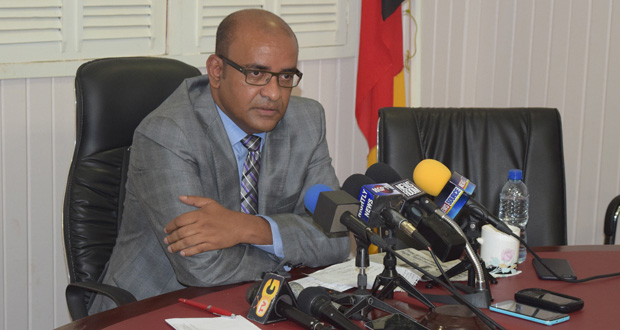
Jagdeo raps gov’t on DDL tax settlement
– claims billions in revenue were lost
OPPOSITION Leader Bharrat Jagdeo has described the tax settlement between Demerara Distillers Limited (DDL) and the Guyana Revenue Authority (GRA) as scandalous, saying it could open the gate for other companies to seek tax refunds.
“The settlement sends the wrong message to the business community — that a company can unilaterally decide to stop paying taxes while other companies comply with the law, take the matter to court, and drag it out until a sympathetic government comes to power and settles its debts to the State,” Jagdeo said in a statement on Saturday evening.
On Tuesday last, DDL announced that it had reached an amicable settlement to resolve a longstanding dispute over Consumption Tax that began in 2002. The company said the settlement follows an extended legal battle between DDL and the GRA, arising out of the Consumption Tax assessment levied against DDL by then Commissioner-General Khurshid Sattaur in January 2009, in the sum of $5.3 billion.
He said that since the settlement was arrived at only on March 9, 2016, it means DDL had use of the money for 15 years.
“If one were to calculate interest on this sum at a rate of 10 per cent per annum, using only the past 10 years, the liability would amount to $10.6B. The GRA assessment of $5.392B was based on a formula handed down by the court, but yet DDL refused to pay,” Jagdeo stated.
According to Jagdeo, the settlement also writes off all possible liabilities in respect of Excise Tax up to March 9, 2016.
“So if the same situation obtains with regard to the Excise tax between 2006 and 2016, then the liabilities would run into tens of billions more,” he contended.
The Opposition Leader said the settlement has opened the door for other companies to seek refunds on taxes paid, claiming that there have already been reports in the private sector of other major companies consulting lawyers about this possibility.
“Management officials from a major local alcohol and beverage-producing company have made it clear, in the past when I was President, that the company would be seeking a refund, depending on the outcome of the DDL matter.
“If this company were to conservatively use DDL’s case to advance a call for a refund of taxes it paid, this could result in the treasury balance being further diminished. Extrapolating, the refund for one company on consumption tax alone could total some $7.6B up to 2006, inclusive of interest,” Jagdeo stated.
He said the total would represent over $16B in revenues lost in the case of only two companies (adding the refund for one company [$7.6] and the liabilities for DDL [$10.6B] and subtracting the $1.5B that was paid by DDL in the settlement).
Jagdeo claimed that during a meeting he had with President Granger, he had offered to have the current Attorney General briefed by his predecessor, Mr Anil Nandlall, about five major cases involving billions of dollars in taxes lawfully due to the State, including the DDL matter; but this offer was rejected.
“This offer was made because the (opposition) People’s Progressive Party/Civic (PPP/C) believes we must safeguard the State’s revenue sources, and this is not a matter that ought to be contaminated by politics.
“After all, it is upon the treasury that we depend to fund all the social interventions that touch lives and affect the welfare of thousands of ordinary Guyanese people,” Jagdeo stated.
Jagdeo wants the government to say if an assessment of DDL’s liabilities in respect of Excise Tax for the period 2006 to 2016 was done, and to state what is the quantum of that liability.
Further, he said it also needs to be made clear who negotiated the settlement, whether it was legal, and whether the settlement was approved by Cabinet or by the board of the GRA.
Jagdeo also wants to know on what principles the sum of $1.5B was arrived at, and he also asked whether there were similar deals.
He said the DDL settlement lacks transparency and speaks of secrecy.
“This settlement, as well as the possibility of other companies seeking refunds, will cost the State billions in revenue dollars –- billions that could have been used in areas that the APNU+AFC coalition told the nation they could not afford to fund,” Jagdeo declared.
He said it would have taken $1.7B to keep the Wales Sugar Estate functional, thereby safeguarding 2,000 jobs and the welfare of 28,000 residents on the West Bank of Demerara. It would have taken $1.6B to continue the “Because We Care” cash grant for 177,000 public schoolchildren across the country. It would have taken a further $500M in water and electricity subsidies that would have benefited upwards of 40,000 pensioners.
“These would have amounted to only $3.8B, but were callously not funded. While these social interventions would have cost only $3.8B, this single tax deal will cost the treasury upwards of $16B for the period 2001 to 2006,” Jagdeo stated.
